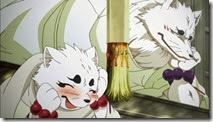 |
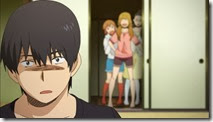 |
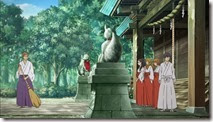 |
It’s hard to believe I ever had any doubts about Gingitsune given how I feel about it right now.
The trajectory for this show has been unidirectional since the third episode, straight up. And so has been my affection for it. I went into this season solidly ranking it as a sleeper, and not just because of the substantial overlap it had with my tastes in anime. I started out mildly liking it, then after the third episode I was pretty much committed if not head-over-heels. Now it’s getting to the point of love, because the execution has caught up to the premise and the sensibility and the entire series has lifted its game to another level as a result.
I talk about tone a lot when discussing anime, but rarely do I see a case where it’s as important as it is with Gingitsune. Tone is generally more important anyway with series that aren’t driven by conventional setup-conflict-resolution narratives (yes, most fall loosely under “slice-of-life” but that terms has been badly mis- and over-used). But with Gingitsune, tone is utterly crucial. The appeal of the series is almost entirely grounded in the way it makes you feel: the scenery, the characters, the interactions, the history. This episode had very little flash to it but for me it was a total success, because the mono no aware was so thick in the air you could have cut it with a knife. The emotions of the characters were so clear without needing to be explained with a lot of heavy dialogue: you knew exactly what Satoru and Haru and Makoto were feeling at every moment and what’s more, you knew exactly why.
It doesn’t hurt that this episode focused heavily on one of the very important themes at its heart, the same one that drives Natsume Yuujinchou’s power: the desire to build connections with other people – and spirits – and the inevitable pain of loss that’s the price that must be paid for doing so. Makoto is just fine as a lead (and I like the work Kanemoto Hisako is doing here, as usual) but her situation simply doesn’t have the inherent pathos that Satoru’s does, and that’s why his addition to the cast was the crucial turning point. Makoto has a kind Dad and a basically happy life, and her relationship with Gintarou is a healthy one despite (or perhaps because of) his complaining about it. Satoru is a different matter – he’s the one who’s built the walls around himself the way Natsume has (though they use different means to buttress them), and it’s likewise through no fault of his own – it was a survival mechanism, plain and simple. But both of them are at-heart kind souls who don’t want to be isolated from other people, and as such their special ability to interact with the spirit world is both a blessing and a curse.
Some of the very best moments in Natsume Yuujinchou came when it reflected on the inevitable chasm that exists between these two worlds, and this episode can stand right there with them. Haru is an annoying little guttersnipe a lot of the time, but for me it’s impossible to watch this episode and not be moved by her devotion to Satoru. Ultimately this has been a Godsend (literally) because without it he would have been utterly alone, but Gintarou realizes all too well that ultimately if he relies too much on it he’ll be condemned to a life of loneliness. Humans belong with humans, no matter how much their Herald loves them and vice-versa – and the thing is, Haru is surprisingly realistic about this too. She knows that at some point she has to let Satoru go for his own good, no matter how painful that is – but she wants so badly to protect his feelings that without Gin’s pushing, she can’t bring herself to do it.
As for Gintarou, there’s not a lot I can say except that he’s a great character – a worthy successor to Nyanko-sensei, though his personality and perspective is quite different. This is the best take on the curmudgeonly mentor trope I’ve seen in anime for a good long time, no small thanks to Miki Shinichirou but also to the way the character is written. His conversations with both Satoru and Haru in this episode were fantastic (as were his snarky asides). For all his put-upon exasperation it’s clear that he cares too much to watch the others flounder when he knows his wisdom could help them right their ship, and in Satoru and Haru he’s found two souls who desperately need him.
Also spot-on this week was the interaction between the “three noisy girls” and Satoru. First of all, it was very interesting to see that Funabashi has a crush on Tatsuo-san, though not entirely surprising given their personalities. He continues the be the anchor for the series, the one who’s always in the background but manages to make a big impact in quiet and subtle ways. Mostly, this was about Satoru’s struggles with himself – sometimes almost literally – as he weighs his reflexive urge to simply be left alone with his desire to lower his walls a little and reconnect with the world. It’s the pushy Ikegami who leads the assault on those walls and manages to make Satoru lose his temper, but something has changed enough in him that he’s able to see where these outreaches are coming from, and check his conditioned response before he permanently closes these new doors before they can really be opened.
I think there’s one key thing that’s changed in Satoru, and it’s very simple: gratitude. Gratitude towards others humans is something he clearly hasn’t felt for a long time (only towards Haru and Otomatsu) but Tatsuo and Makoto have shown him kindness with no ulterior motive, and accepted him unconditionally. Gratitude is very fundamental to the entire concept of the Shinto Shrine – it’s a place to show appreciation for the gifts that give humans the opportunity to live their short and humble lives. That’s why Satoru’s act of giving the charms to Funabashi and Ikegami was a quietly important symbolic moment – not just because it’s only in the giving of them to others one cares about that they have meaning, but also because it shows how far he’s come in being able to appreciate that others can be good to him simply for its own sake. As for me, I’m grateful to have another anime which captures these feelings as well as Gingitsune can.
 |
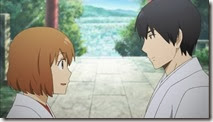 |
 |
 |
 |
 |
 |
 |
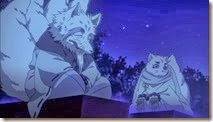 |
 |
 |
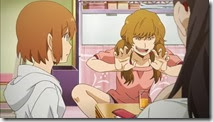 |
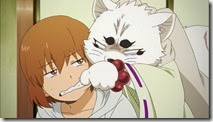 |
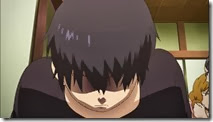 |
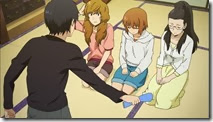 |
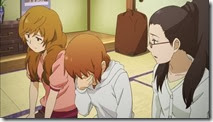 |
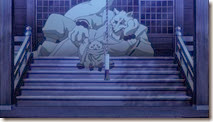 |
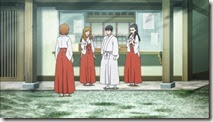 |
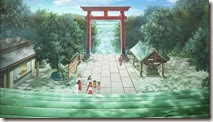 |
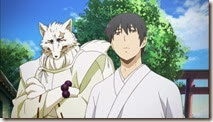 |
 |
 |
 |
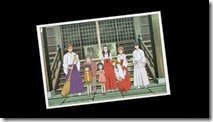 |


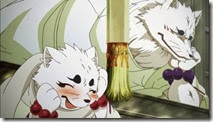
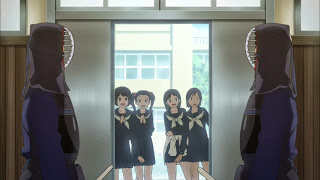
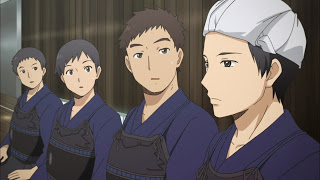
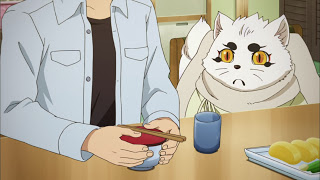
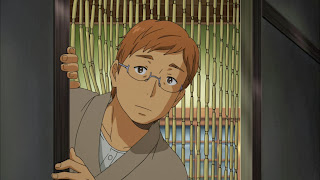
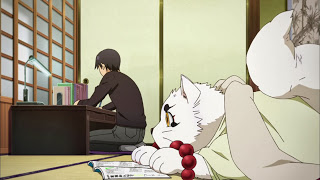
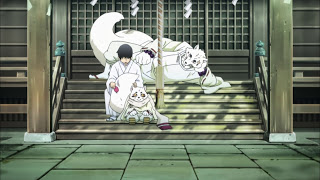
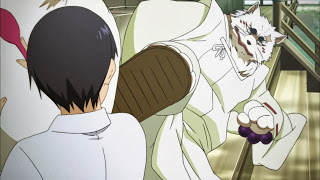

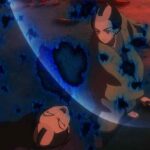
thedarktower
November 11, 2013 at 1:31 pmlovely episode.
reminiscent the feelings of Natsume, yet we can clearly say – this is Gingitsune style!
what I love in Gingitsune is how it's talking about things. neither heavy nor light, but silently. it's quite deep, but not overthinking or depressing(or joyful) toward the viewer.
Gingitsune do it very well. first taking apart the characters and their emotions, then it's building everything with a slight change, so we don't see our a change in major scale, but something small yet important and touching, like the gratitude you've mentioned.
another thing I love is the chemistry with the characters (which helps bringing the feelings closer to the viewers). each one contributes its speciality to the atmosphere. this way, I can't say we actually have one key character surrounding everyone around her. everyone of them is making a small yet important effect on the others, whether it's makoto's dad, makoto, Gin, Haru, satoru and the girls (even the youngsters popping out from time to time).
for me, there's a click with each character and all of them as a complex.
I still have troubles to fully grasp Gin. for sure, he is mature and has a lot experience and life-wisdom, yet I feel…something I can't really point about him..that makes me feel a various of feelings and thoughts toward him. he is a very special character. very different than Nyanko-sensei.
really thanks for blogging Gingitsune!
too bad you are not blogging it in RC (one like me is wondering why :P) .
it could have been significant addition there. besides it's one of the surprises this year (:
admin
November 11, 2013 at 11:18 pmBlogging any show at RC requires a large additional time commitment, which is something I don't have to spare. And I'm not sure this series (or Yowapeda, for example) would draw much of a following over there.
Gary Cochran
November 12, 2013 at 2:10 amToo many good shows this season. What do you think of Non Non Byori? I really find it funny. Very similar to Minami-ke.
admin
November 12, 2013 at 6:31 amI had it as a sleeper but it didn't really work for me. I don't find it anywhere near as funny as M-K – more in the cute girls being cute category.
Flower
November 11, 2013 at 4:43 pmAnother excellent summary Enzo – am so glad you are blogging this series. ^^
Brother Roranoa Zolo
November 13, 2013 at 6:42 amThank you for blogging this series! It feels good to know I'm not alone in my appreciation for the the series that don't get a lot of press or fanfare – Hunter x Hunter, Uchouten Kazoku, Yowamushi Pedal, etc.
When I look at Gintarou I get the feeling that he has gained wisdom and learned his lessons the hard way through experience. I don't think his curmudgeonly act is there to just keep humans at a distance; I think he relies on it to keep himself in check so as to not become a larger version of Haru – I agree with you that he really does care but he has put in place boundaries for his emotions based on his past painful experiences.
admin
November 13, 2013 at 7:44 amYes, I agree – he's quite deliberately keeping a distance between himself and others, especially humans. And don't forget his fellow Herald bolted on him a hundred years ago.